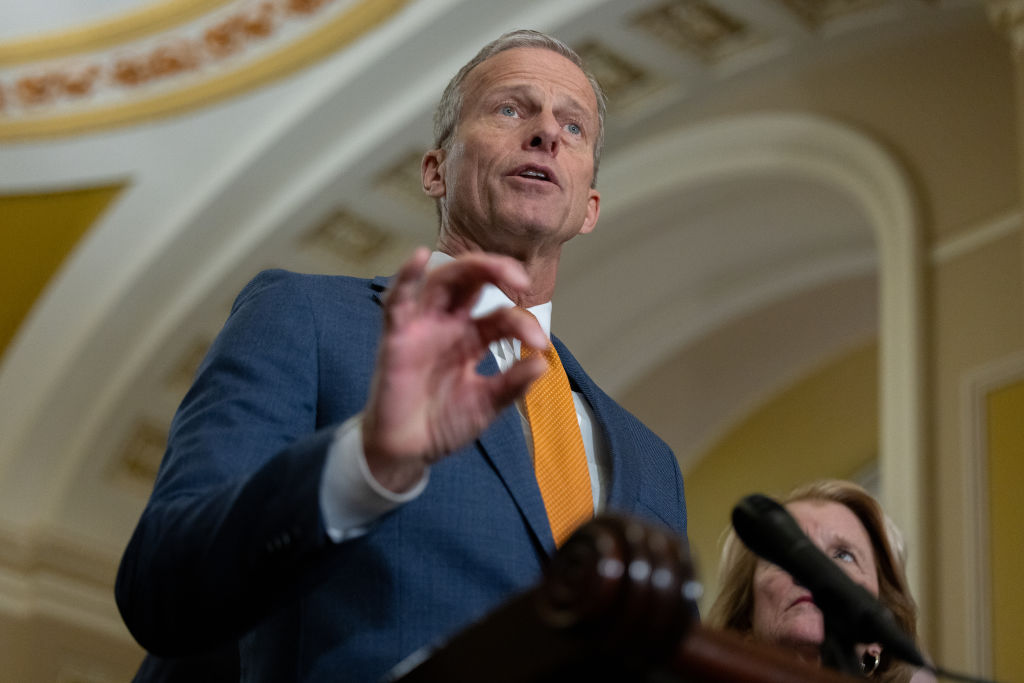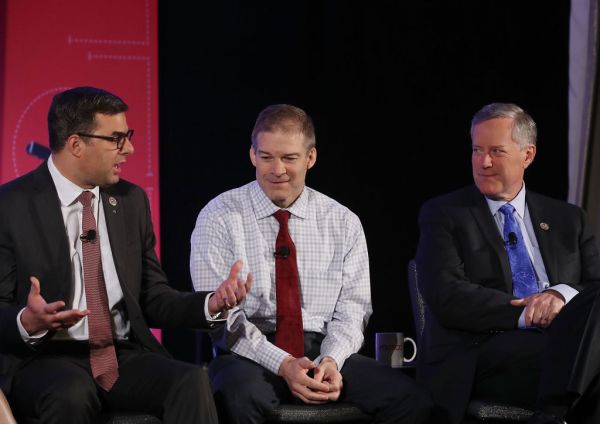Republicans in the Senate seem to have had it with the pace of progress from the House of Representatives in enacting key parts of President Donald Trump’s agenda.
Rather than wait for Speaker Mike Johnson and GOP House members to propose a bill for the budget reconciliation process—by which the Senate can pass certain key fiscal policies without having to break a filibuster—the Senate decided Wednesday to push ahead with its plan for legislation. Next week, members of the Senate Budget Committee will take the first step in putting together a bill containing Chair Lindsey Graham’s proposal to give hundreds of billions of dollars to the military and border security.
As House members continue to disagree over the size of spending cuts, Graham and Senate Majority Leader John Thune chose to take their own approach. “We are of the opinion that it’s time for the Senate to move,” Graham told reporters after a lunch where he pitched his plan to the Republican Senate conference. “I appreciate what the House is trying to do, but I think it’s very important that we get to [Trump border czar] Tom Homan the money he needs to complete the plan President Trump promised.”
The move by Graham and Thune is the culmination of a disagreement between Republicans in the two chambers of Congress over how to best put in place the policies Trump campaigned on. Senators, particularly Thune, have supported doing two bills so that they can get some quick legislative victories, especially on border security. Johnson, on the other hand, knows he is hobbled by his slim majority and fractious GOP conference. He hasn’t been optimistic about the prospect of passing two bills, figuring one large bill that includes border security funding, spending cuts, and tax cut extensions has a better shot at passage.
However, the House Republican conference has proven so unruly that Johnson has struggled even to get a bill proposed, much less meet his goal of having it passed by the end of April. The House Budget Committee this week had to cancel a planned markup—which would have been the first step in getting a bill through the chamber—as leadership faced a familiar hurdle: the demands from hardliners for massive spending cuts. After House GOP members emerged from their retreat at the Trump National Doral Miami resort last week, leadership offered the conference $700 billion in spending cuts, but fiscal hawks wanted more. Rep. Ralph Norman of the House Freedom Caucus told Punchbowl News he hoped for as high as $2 trillion, a number leadership did not think was possible to push through Congress.
After the budget committee canceled the markup meeting, frustration began building in the Senate. Before they met to discuss their plans Wednesday, Senate Republicans did not appear to have much of a preference as to which chamber made the first move but acknowledged that time was growing short to hammer out a bill. “I think my House colleagues would prefer to go first, and I’m fine with that, but they need to saddle up and ride,” Sen. John Kennedy of Louisiana told The Dispatch.
The question of whether to implement Trump’s budget and policy priorities with one bill or two has been a live one since even before the inauguration, and Trump has done little to clarify his wishes. First he said he wanted “one powerful bill” to push his agenda through, but later said that while his preference was “one big, beautiful bill,” he was open to alternatives.
GOP senators came out of their meeting with a plan to move forward with their version of a reconciliation bill, ready to pursue the two-bill strategy.
“I’ve always believed that ‘one big, beautiful bill’ is too complicated,” Graham said. “What unites Republicans, for sure, is border security and more money for the military. It’s important we put points on the board, and this plan of the president to deport people and to get rid of the gangs and the criminals is running into a wall of funding. So, I think it’d be a real mistake for the Republican Congress not to give the Republican administration the money they need to execute the plan, and the only way to get that money is through reconciliation.”
Graham said his bill will call for about $150 billion for border security and about the same sum for the military. The spending would be offset by cuts elsewhere, but he didn’t offer specifics.
“We will instruct committees, authorizing committees, to go find pay-fors that are reconciliation-compliant, so that this thing is basically paid for,” he told reporters.
Members of the Freedom Caucus, which has supported a two-bill strategy, were noncommittal about supporting the legislation until it took shape.
“It doesn’t surprise me,” Norman said of the Senate’s move. “We have wasted enough time. I was hoping we can get ours first. That’s where it ought to come from. We control the purse strings. So, we’ll see what it looks like.”
Norman added that he planned to meet with some members of the House and Senate Wednesday night. Meanwhile, Rep. Kevin Hern of Oklahoma, who is head of the Republican Policy Committee, also said he was unsurprised by the Senate’s plan to move forward on legislation.
“I’ve said countless times I’m 100 percent supportive of President Trump, whatever he’s wanting. He’s willing to push these bills forward,” Hern told The Dispatch. “You’ve heard him say time and time again, he doesn’t care if it’s one bill or two. The speaker wants to do one bill, and we’re continuing to work forward on that.”







Please note that we at The Dispatch hold ourselves, our work, and our commenters to a higher standard than other places on the internet. We welcome comments that foster genuine debate or discussion—including comments critical of us or our work—but responses that include ad hominem attacks on fellow Dispatch members or are intended to stoke fear and anger may be moderated.
With your membership, you only have the ability to comment on The Morning Dispatch articles. Consider upgrading to join the conversation everywhere.